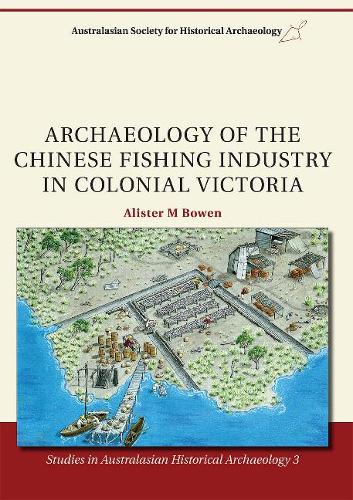
Archaeology of the Chinese Fishing Industry in Colonial Victoria
(Paperback)
Publishing Details
Archaeology of the Chinese Fishing Industry in Colonial Victoria
By (Author) Dr Alister M. Bowen
3
Sydney University Press
Sydney University Press
1st December 2012
Australia
Classifications
Professional and Scholarly
Non Fiction
639.20
Physical Properties
Paperback
156
Width 210mm, Height 297mm, Spine 8mm
520g
Description
During the 1850s and 1860s, Chinese immigrants played a major role in the development of the fishing industries in Australia. Prior to their involvement, the industry was hampered by the problems posed by the transportation of fish to market. It was common for whole catches of fish to putrefy before they could reach their destination. The influx of Chinese gold miners, who relied on fish as a dietary staple, increased the demand that prompted the creation of many Chinese fish-curing establishments.
Chinese fish curers in colonial Australia fished but also purchased large quantities of fish, creating a new and reliable market for European fishermen. Fish-curing businesses supplied their compatriots on the goldfields with fresh and cured fish. These establishments, which made sums of money far greater than any European fishing operation, provided hundreds of jobs for both European and Chinese Australians in the fishing industry.
Very few pieces of documentary evidence, along with archaeological records from one colonial-period Chinese fish-curing camp in Victoria, remain. They reveal a fascinating story of how Chinese fish curers successfully dominated Australia's fishing industry; how they lived, worked, organised themselves, participated in colonial society, and the reasons why they suddenly disappeared.
Reviews
'This work is important as it provides the first investigation of the
Chinese fishing industry in Australia. Future historical archaeologists
can build on Bowen's work in other countries where the Chinese engaged
in the fishing during the nineteenth century.'
'This work was originally a PhD thesis and is a fine example of the need for
more monographs in all disciplines, particularly Australian history. Reading
Archaeology can only benefit historians. Archaeologists model evidence
interpretation in markedly creative and distinctive ways, their conclusions are
careful and measured and they must elaborate their theoretical base clearly ... a must for all historians of the late nineteenth century.'
Author Bio
Alister Bowen completed a PhD in archaeology in 2007 at La Trobe University. His research interests include archaeological heritage management, archaeological procedures, site conservation and the archaeology of cultural contact. He has worked on a wide range of archaeological projects throughout the ACT, NSW and Victoria.
